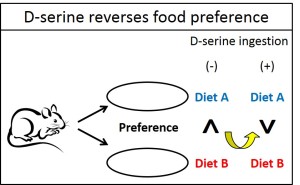Sasaki T, Matsui S, Yokota-Hashimoto H, Kitamura T (IMCR, Gunma Univ.) Kinoshita Y, Kinoshita K, Amano N (Dept. Psychiatry, School of Medicine, Shinshu Univ.) Kakuta S (Research Center for Human and Environmental Sciences, Shinshu Univ.) Iwasaki Y, Yada T (Div. Integrated Physiology, Dept. Physiology, Jichi Medical University School of Medicine) Kinoshita T (Dept. Analytical Chemistry, School of Pharmacy, Kitasato Univ.)
About
d-Serine is abundant in the forebrain and physiologically important for modulating excitatory glutamatergic neurotransmission as a coagonist of synaptic N-methyl-d-aspartate (NMDA) receptor. NMDA signaling has been implicated in the control of food intake. However, the role of d-serine on appetite regulation is unknown. To clarify the effects of d-serine on appetite, we investigated the effect of oral d-serine ingestion on food intake in three different feeding paradigms (one-food access, two-food choice, and refeeding after 24-h fasting) using three different strains of male mice (C57Bl/6J, BKS, and ICR). The effect of d-serine was also tested in leptin signaling-deficient db/db mice and sensory-deafferented (capsaicin-treated) mice. The expression of orexigenic neuropeptides [neuropeptide Y (Npy) and agouti-related protein (Agrp)] in the hypothalamus was compared in fast/refed experiments. Conditioned taste aversion for high-fat diet (HFD) was tested in the d-serine-treated mice. Under the one-food-access paradigm, some of the d-serine-treated mice showed starvation, but not when fed normal chow. HFD feeding with d-serine ingestion did not cause aversion. Under the two-food-choice paradigm, d-serine suppressed the intake of high-preference food but not normal chow. d-Serine also effectively suppressed HFD intake but not normal chow in db/db mice and sensory-deafferented mice. In addition, d-serine suppressed normal chow intake after 24-h fasting despite higher orexigenic gene expression in the hypothalamus. d-Serine failed to suppress HFD intake in the presence of L-701,324, the selective and full antagonist at the glycine-binding site of the NMDA receptor. Therefore, d-serine suppresses the intake of high-preference food through coagonism toward NMDA receptors.
Paper information
N-methyl-d-aspartate receptor coagonist d-serine suppresses intake of high-preference food.
Sasaki T, Kinoshita Y, Matsui S, Kakuta S, Yokota-Hashimoto H, Kinoshita K, Iwasaki Y, Kinoshita T, Yada T, Amano N, Kitamura T.
Am J Physiol Regul Integr Comp Physiol. 2015;309(5):R561-75. Epub 2015 Jul 8.
Online URL
http://www.ncbi.nlm.nih.gov/pubmed/26157056








